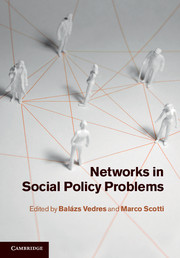
-
Select format
-
- Publisher:
- Cambridge University Press
- Publication date:
- 05 September 2012
- 23 August 2012
- ISBN:
- 9780511842481
- 9781107009837
- Dimensions:
- (247 x 174 mm)
- Weight & Pages:
- 0.7kg, 312 Pages
- Dimensions:
- Weight & Pages:
- Subjects:
- Physics and Astronomy, Sociology: General Interest, Statistical Physics, Sociology
You may already have access via personal or institutional login- Subjects:
- Physics and Astronomy, Sociology: General Interest, Statistical Physics, Sociology
Book description
Network science is the key to managing social communities, designing the structure of efficient organizations and planning for sustainable development. This book applies network science to contemporary social policy problems. In the first part, tools of diffusion and team design are deployed to challenges in adoption of ideas and the management of creativity. Ideas, unlike information, are generated and adopted in networks of personal ties. Chapters in the second part tackle problems of power and malfeasance in political and business organizations, where mechanisms in accessing and controlling informal networks often outweigh formal processes. The third part uses ideas from biology and physics to understand global economic and financial crises, ecological depletion and challenges to energy security. Ideal for researchers and policy makers involved in social network analysis, business strategy and economic policy, it deals with issues ranging from what makes public advisories effective to how networks influence excessive executive compensation.
Contents
Metrics
Altmetric attention score
Full text views
Full text views help Loading metrics...
Loading metrics...
* Views captured on Cambridge Core between #date#. This data will be updated every 24 hours.
Usage data cannot currently be displayed.
Accessibility standard: Unknown
Why this information is here
This section outlines the accessibility features of this content - including support for screen readers, full keyboard navigation and high-contrast display options. This may not be relevant for you.
Accessibility Information
Accessibility compliance for the PDF of this book is currently unknown and may be updated in the future.


